(Blog against sexism day entry)My grandmother, who died last month, lived a humble life. She was born a farm girl, raised a farm girl. She did farm girl chores, and while that included the overwhelming kind of early 1900’s housework that women did, it also included some of the really tough farm labor. At an early age, my grandmother knew all about hard work.
But she was born into a patriarchal system.
She married young. I don’t know why, but probably for the same reasons those of us who marry young do such a thing: an immature belief that joining ourselves to another will fill our grand canyons of yearning -- psychological, emotional, sexual yearning – along with our failure to see other options. Yet in 1930-something, what might those options have been? She didn’t talk about the marriage much because my pitiful alcoholic grandfather left her when she was still relatively young, left her with three kids to care for during the depression. He came back sometimes, then left again. The final break came, I think, post WWII, maybe in the Korean War era, shortly before I was born. As a young adult, my grandmother knew all about hardship.
She came into adulthood and married into a patriarchal system.
This meant that when the husband, who was supposed to be the breadwinner, left, and she was left to provide for her family of four, she had to figure out a way to make that living. She had graduated high school. (And only recently do I realize how extraordinary that was considering that she would have done so during the depression, and in an era when many people, never mind a farm girl, didn’t graduate high school. This says something about my great-grandparents and/or their little community. In contrast, my pitiful alcoholic grandfather from a few towns over didn’t graduate.) But her high school diploma, it turns out, didn’t seem to qualify her for employment beyond low-paying food services chores and the like. She had a relatively interesting (at least to hear about) job at the Rock Island Arsenal during WWII, but it too was “unskilled” and relatively low-paying.
Although I knew her for 52 years, in some ways my grandmother was a cipher. For instance, she was a killer Scrabble player. Trust me, this takes a level of intelligence that many don’t have. She could beat me, the official family brain, on a regular basis. And the killer Scrabble player must know how to, um, spell. Even though her writing skills were serviceable rather than publishable, they still would put many a college freshman to shame. In other words, she wasn’t stupid. So why did she live her life at the bottom of the economic food chain?
She grew old in a patriarchal system.
She didn’t expect much for women: a “good” marriage would be a desirable thing, but she knew far too few women got that. Having a “good” job, then, would be the best thing that could happen to a woman, but she seemed to think a “good” job was something in an office (remember, office workers, that this was not her experience), and especially if that office job was a government job that included a retirement plan.* Ironically, then, the alpha and omega of all conflict between us was my itch, after
my husband left, to get an education.** She wanted me not to push myself so hard. She didn’t understand my ambition, as relatively modest as it was. I was smart; why wasn’t I satisfied to type in a clean, air-conditioned office? It took me 16 years to get from high school graduate to Master of Arts, and we tussled about this for 14 of those years. (I think the fight just left her when I received my bachelor’s degree in early December 1995 and instead of “retiring” from school began my master’s work in January 1996.)
There were a lot of things she thought women shouldn’t do. One was become President.
Anything managerial ought to be in the hands of men.
Here’s the big irony: she didn’t trust men and didn’t like most of them, although when she did approve, she approved enthusiastically. But despite her distrust and dislike, she thought men should be running the world.
This, then, is how sexism hurt me: it hurt the most influential person in my life (and my mother’s). This person was a woman who fully expected that women should be second-class citizens. And even though this was her belief, she never would have articulated it that way. She was so fully a part of the world that said her place was running the dishwasher in the hospital kitchen, that her belief in it was invisible to her.
Thanks to social programs and her own careful way with money, she very modestly got by in her retirement.
But she shouldn’t have been suckered into believing that that’s how it ought to be.
___________________
*I now have a government job with a retirement plan.
**I had the itch before, but hubby literally check-mated (pun intended) any attempts I made to go to school while married.









